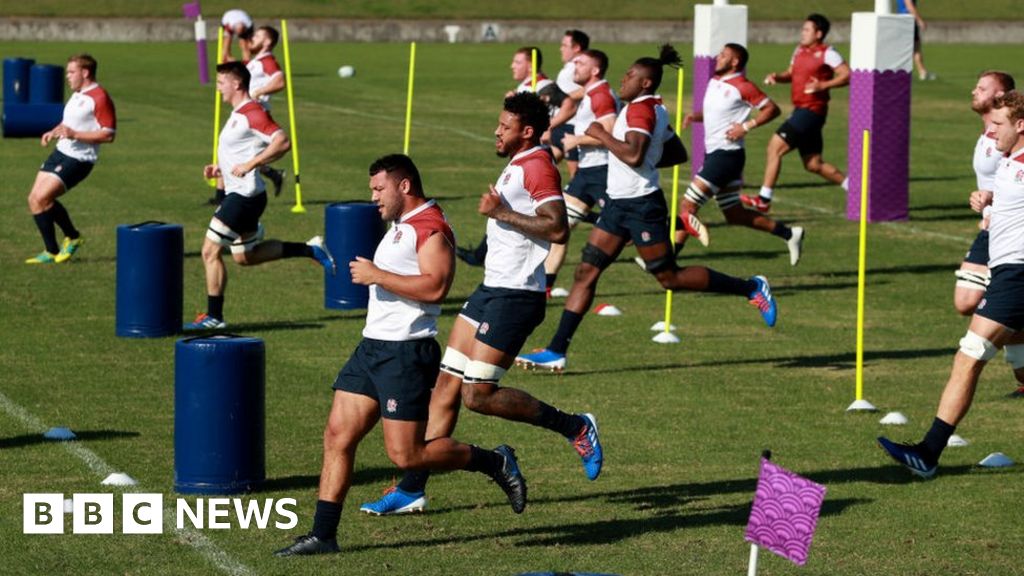
The hopes of a nation will be decided on Saturday as England take on South Africa in the Rugby World Cup final.
But what is the background of the players in the so-far successful squad?
Facing the Springboks in Yokohama is a group mostly born in the south but which includes players from five other nations.
England's number eight, Billy Vunipola, and his brother, Mako, were born in New Zealand and Australia respectively. They first moved to the UK in 1998 when their father, Fe'ao, played for Pontypool in Wales. They later moved to England.
Joe Cokanasiga was born in Fiji and moved to England when he was three, while his father served in the British Army.
Other players with overseas birthplaces include Sam Underhill, who was born in Ohio in the USA, Willi Heinz, who is from New Zealand, and Manu Tuilagi, who was born in Samoa and came to England as a child to be with his older brothers who were Samoa internationals playing for club sides in the UK.
To qualify to play in the England squad, team members must have been born in or have a parent or grandparent who was born in the country. They would also qualify if they have lived in England for at least three consecutive years.
Overall, 16 of the English-born team members were from either the South East, South West or London, with the remaining 10 from the East Midlands, North West or east of England.
Yorkshire and the Humber, the West Midlands and the North East were the only unrepresented regions.
John Williams, Associate Professor of Sociology at the University of Leicester, said the representation of players across the country was a result of the traditional geography of rugby union and rugby league.
"In the south, rugby was shaped by ex-public school boys who valued amateurism," he said. "The north of England is where they have professional rugby league."
Before 1995, rugby union players were not allowed to be paid. Prof Williams said this was a throw-back to when union was considered a middle and upper class game, with players being affluent enough not to need an income from the sport.
"People in the north started to play rugby league and saw no reason why players shouldn't be paid," he added, saying this was influenced by the working class backgrounds of league players at the time.
"There are few union clubs in the north that have been able to establish themselves in the recent elite level of the game but clubs have continued to thrive in some of those original southern heartlands."
Although born in different areas, four of the team members, Owen Farrell, George Ford, Maro Itoje and Jack Singleton all attended the same school in Hertfordshire.
St George's School, in Harpenden, is a comprehensive school for students aged 11 to 18.
Current head of rugby, Neil Harris, said students would be "incredibly proud" of the players "no matter what happens on Saturday".
"The manner in which they've conducted themselves makes them exceptional role models for our current boys," he added.
'They'll give everything'
Mr Harris said St George's plays rugby during two terms of the year while many independent schools only played it for one.
But it was "just one piece of the jigsaw" that allowed Farrell, Ford, Itoje and Singleton to flourish, he added.
"We do Saturday fixtures from September through to Easter," he said. "For a state school to play so many fixtures, it makes us unique".
Wishing the former students luck in the world cup final, Mr Harris said: "We know they'll work exceptionally hard, they'll give everything."
The team in numbers
The average (median) age of the full 32-man England squad is 27-and-a-half.
Willi Heinz and Dan Cole are the joint oldest members, at 32, while Tom Curry and Joe Cokanasiga are the joint youngest, aged 21.
The squad has an average of 36 caps per player, with Dan Cole boasting the most - with 94 appearances.
Unsurprisingly, the team isn't small, with an average height of six feet and one inch (186 cm) and an average weight of about 16 stone (103 kg).
Courtney Lawes is the tallest player, standing about five inches above the average at 6ft 6ins (200 cm), while Billy Vunipola brings nearly 20 stone (127 kg) to the field as the heaviest player.
The final: All you need to know
Venue: Yokohama International Stadium
Date: Saturday, 2 November
Kick-off: 09:00 GMT
Coverage: Live radio commentary on BBC Radio 5 Live and live text commentary on the BBC Sport website and app.
England team to play South Africa: Elliot Daly; Anthony Watson, Manu Tuilagi, Owen Farrell, Jonny May, George Ford, Ben Youngs; Mako Vunipola, Jamie George, Kyle Sinckler, Maro Itoje, Courtney Lawes, Tom Curry, Sam Underhill, Billy Vunipola
Replacements: Luke Cowan-Dickie, Joe Marler, Dan Cole, George Kruis, Mark Wilson, Ben Spencer, Henry Slade, Jonathan Joseph















 Phone: (800) 737. 6040
Phone: (800) 737. 6040 Fax: (800) 825 5558
Fax: (800) 825 5558 Website:
Website:  Email:
Email: 






